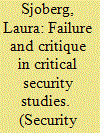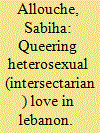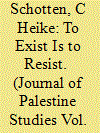|
|
|
Sort Order |
|
|
|
Items / Page
|
|
|
|
|
|
|
| Srl | Item |
| 1 |
ID:
164287


|
|
|
|
|
| Summary/Abstract |
Debates imitates scholarship, which imitates debate. Using perspectives from both my policy debate career and my research career, this article argues that the enterprise of critique, whether in critical security studies or elsewhere, is always and already failing and failed. It proceeds in four sections. The first section sets up my entry into the problems of/with critique. The second section analyzes the types of dissonances inherent in the production of critical security studies scholarship. The third section theorizes those dissonances as failures – arguing that failure itself is a part of in and of critical security studies. The conclusion discusses where to go from, during, and in a world of failed critique in critical security studies.
|
|
|
|
|
|
|
|
|
|
|
|
|
|
|
|
| 2 |
ID:
177196


|
|
|
|
|
| Summary/Abstract |
In this paper, I explore the ways in which queer sex acts and orientations come to be coded through other modes of signifying excess in colonial and nationalist discourse. I explore the way in which food and sex are held on a continuum that ties gluttony to abstinence, creating the standards for respectable sexuality and a map for flouting them. Fundamentally, I look at how sex and food are conflated, especially when enjoyed or imagined in ways outside the norm of conventional morality. Moreover, I examine the terms through which this correlation is translated into a broader framework for thinking about the body in its private and shared forms.
|
|
|
|
|
|
|
|
|
|
|
|
|
|
|
|
| 3 |
ID:
190951


|
|
|
|
|
| Summary/Abstract |
In the intellectual history of modern Japan, the late 1880s epitomized the Meiji government’s effort to ‘civilize’ through Westernization, driven by the social Darwinian vision of the survival of the fittest. During this period in the United States, the ideas of civilization theory, informed by the very antithesis of the Meiji state’s understanding, surfaced in the life and work of the aspiring young naturalist-botanist Minakata Kumagusu. He imagined a ‘different kind of civilization’ as he re-examined the nature of social evolution in microbes by turning to Indian-and-Chinese-derived knowledge of his home region of Kii, Japan. Buddhism, persecuted by the Meiji regime, most notably enabled his scientific enquiry, while the encyclopedic work of Wakan Sansai Zue (The Illustrated Three Knowledge of Sino-Japan) became another key inspiration. Chinese historiography and Confucian thoughts additionally facilitated his reasoning.
What interconnected all of these strands was what the author refers to as ‘queer nature’: the basis for truths whose ontological and experiential qualities resembled the microbe slime mould. Similar to this microbe that captured Kumagusu’s imagination, with queer nature the process of knowing defied the epistemological dichotomies and hierarchies that were fundamental to the social Darwinian theory of evolution. Experientially, it attracted the knower’s attention, induced their desire for intimacy with strange and curious others, and propelled greater intellectual enquiries. The article thus demonstrates a queer theory of intellectual history rooted in modern Japan, whose intellectual lineage derived from India and China instead of the West.
|
|
|
|
|
|
|
|
|
|
|
|
|
|
|
|
| 4 |
ID:
182440


|
|
|
|
|
| Summary/Abstract |
Genocidal violence centrally targets the social bonds that hold communities together. In postcolonial contexts, it is well documented that social relations can be characterised by heteronormativity. Furthermore, postcolonial scholars have done extensive work on demonstrating the link between colonialism and genocidal violence. Responding to a gap in the academic literature, this article interrogates the relationship between (post)colonial heterosexuality and genocide. Seeing queer theory as also relevant to the study of non-queer individuals’ experiences, this article argues that postcolonial genocidal violence can be characterised by attempts to impede heterosexual group reproduction. Using the Rohingya Genocide in Myanmar as an illustrative case-study, it argues that the emergence, character and legitimisation of violence here depended on the construction of heteronormative subject-positions. Furthermore, it argues that genocidal violence reinforces the subject-positions it is rooted in, giving them the appearance of immutable facts. From this basis, the article concludes that postcolonial genocidal violence can be read as a performance of heterosexuality.
|
|
|
|
|
|
|
|
|
|
|
|
|
|
|
|
| 5 |
ID:
170053


|
|
|
|
|
| Summary/Abstract |
This article draws on a year of ethnography conducted among cis heterosexual couples in contemporary urban Lebanon in order to argue that, in the absence of a serious project of national reconciliation, intersectarian love, despite its short lifespan, constitutes restorative instances in post–civil war Lebanon. Intersectarian hetero desire emerges as a counter-discourse that threatens the masculinist foundations of the Lebanese state. By tracing the timeline of love in the life of Lebanese citizens, this article places personal narratives of “impossible” intersectarian love stories in conversation with queer temporality scholarship in order to recognize the political, albeit limited, potential of romantic love. Here, societal expectations of married life are replaced by an ephemeral unity that operates in contra to hegemonic interpretations of “man and wife.”
|
|
|
|
|
|
|
|
|
|
|
|
|
|
|
|
| 6 |
ID:
161103


|
|
|
|
|
| Summary/Abstract |
This article provides an outline of the project of queer theory and the ways that this project has (and has not) engaged with the question of Palestine. Ultimately, the author argues that queer theory and Palestinian liberation share, albeit perhaps unwittingly, a defining resistance to elimination and an enduring commitment to unsettlement. As such, queer politics is and can surely become decolonial praxis, just as decolonization has a clear affinity with dissident queer resistance.
|
|
|
|
|
|
|
|
|
|
|
|
|
|
|
|
|
|
|
|
|